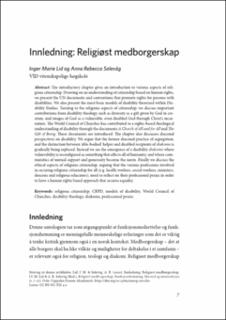| dc.contributor.author | Solevåg, Anna Rebecca | |
| dc.contributor.author | Lid, Inger Marie | |
| dc.date.accessioned | 2020-10-19T12:47:14Z | |
| dc.date.available | 2020-10-19T12:47:14Z | |
| dc.date.created | 2020-08-17T12:12:46Z | |
| dc.date.issued | 2020 | |
| dc.identifier.citation | Religiøst medborgerskap: Funksjonshemming, likeverd og menneskesyn. | en_US |
| dc.identifier.isbn | 978-82-02-68108-1 | |
| dc.identifier.uri | https://hdl.handle.net/11250/2683676 | |
| dc.description | This work is licensed under a Creative Commons Attribution-NonCommercial-NoDerivatives 4.0 International License. | en_US |
| dc.description.abstract | The introductory chapter gives an introduction to various aspects of religious citizenship. Drawing on an understanding of citizenship based on human rights, we present the UN documents and conventions that promote rights for persons with disabilities. We also present the most basic models of disability theorized within Disability Studies. Turning to the religious aspects of citizenship, we discuss important contributions from disability theology such as diversity as a gift given by God in creation, and images of God as a vulnerable, even disabled God through Christ’s incarnation. The World Council of Churches has contributed to a rights-based theological understanding of disability through the documents A Church of All and for All and The Gift of Being. These documents are introduced. The chapter also discusses diaconal perspectives on disability. We argue that the former diaconal practice of segregation, and the distinction between ‘able-bodied’ helper and disabled recipients of diakonia is gradually being replaced. Instead we see the emergence of a disability diakonia where vulnerability is reconfigured as something that affects all of humanity, and where communities of mutual support and generosity become the norm. Finally we discuss the ethical aspects of religious citizenship, arguing that the various professions involved in securing religious citizenship for all (e.g. health workers, social workers, ministers, deacons and religious educators), need to reflect on their professional praxis in order to have a human rights based approach that secures equality. | en_US |
| dc.language.iso | nob | en_US |
| dc.relation.ispartof | Religiøst medborgerskap. Funksjonshemming, likeverd og menneskesyn | |
| dc.rights | Attribution-NonCommercial-NoDerivatives 4.0 Internasjonal | * |
| dc.rights.uri | http://creativecommons.org/licenses/by-nc-nd/4.0/deed.no | * |
| dc.title | Innledning: Religiøst medborgerskap | en_US |
| dc.type | Chapter | en_US |
| dc.description.version | publishedVersion | en_US |
| dc.rights.holder | Copyright (c) 2020 Inger Marie Lid & Anna Rebecca Solevåg | en_US |
| dc.source.pagenumber | 7-22 | en_US |
| dc.identifier.doi | https://doi.org/10.23865/noasp.100 | |
| dc.identifier.cristin | 1823579 | |
| cristin.ispublished | true | |
| cristin.fulltext | original | |
| cristin.qualitycode | 1 | |

